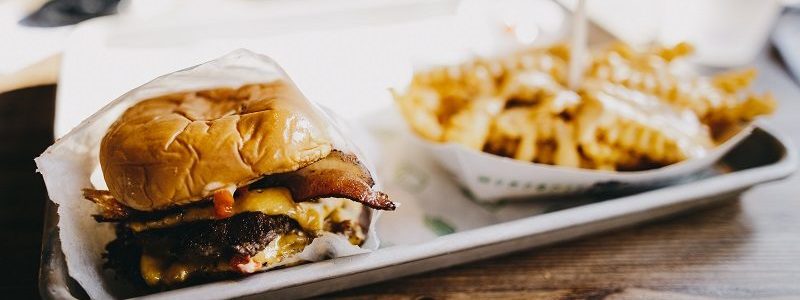On a stressful day, do you find yourself craving a nice juicy Cheeseburger, French Fries and a Coke? You may feel it is comfort food, and you deserve to indulge.
However, in the long run, eating that way will not relieve stress. It just could be causing you more anxiety!
How? What is it about those foods that trigger anxiety?
Sugar
The coke has sugar in the form of high fructose corn sugar, plus caffeine.
High fructose corn sugar is refined, and is metabolized by the body very quickly. One problem this can create is a spike in blood sugar, then it suddenly drops. This drop will often trigger anxiety, and is worsened by caffeine.
Research published in 1966 showed just this. This study looked at people whose blood sugar suddenly dropped without reaching the dangerous low hypoglycemic range.
They experienced anxiety, depression, insomnia, trembling, racing heart, dizziness, and forgetfulness. Just from eating sugar, refined carbohydrates and caffeine! Do you see any down side to that coca cola right now?
Once they were put on a diet with low sugar, high protein, and eliminated caffeine, their blood sugar levels evened out and their anxiety symptoms were gone. This anxiety and other symptoms were reversed with a change in diet.
The second problem with the high fructose corn syrup in coca cola is that with too much, your body cannot process it quickly enough. This leads to the release of cytokines which produce inflammation in the body. The inflammation affects many systems, including the brain, producing anxiety.
Caffeine
Caffeine itself may also be a culprit. Caffeinated drinks, such as coca cola can make you jittery because they stimulate a flight or fight response in the body. That response feels like anxiety. Add that to a drop in blood sugar, and that spells real trouble in staying calm amidst stress.
Sugar and caffeine may be the more obvious food triggers for anxiety. Let’s now look at the hamburger bun.
The Bun
The bread of the bun has refined flour which contains gluten, and that is two strikes against it. The flour is a refined grain, and that goes in your system like sugar, producing some of the same effects discussed above. The grain of the bun is wheat, which contains gluten, which is more problematic than you may think.
A large portion of the population who eat wheat is sensitive to gluten without realizing its effects. I am not talking about those with Celiac disease or gluten intolerance. Anyone may experience pain and digestive problems, thinking it is something else.
What is more insidious is that gluten can also trigger anxiety. If you are now going to request the gluten-free bun, know that refined gluten-free grains can also trigger anxiety.
The Meat and Cheese
Now let’s look at the hamburger meat. Most likely it is not high quality, but beef conventionally raised. These animals receive the triple whammy of hormones, antibiotics and grain instead of grass. This makes the meat cause inflammation in the body, including triggering anxiety.
And what about the cheese on the cheeseburger? Is it real or a cheese product made with processed vegetable oils? If these oils are not in the cheese, then they are in the bun, and certainly in the French fries. In any form, these processed oils cause inflammation, and – you know the story – can trigger anxiety.
Additives
Backtracking on your burger, fries and coke, any part of this comfort meal may have artificial flavorings. These are designed to enhance flavor, texture, or color, or to extend shelf life.
Is there MSG in the meat? Other additives in the bun?
Or you may top off the meal with a milk shake or cookie. Any and all of this can lead to inflammation, increase the risk of disease, and trigger anxiety.
Healing Foods
OK, we have nixed the burger, fries and coke. What to eat instead?
With all the mention of these foods causing inflammation, we would look to foods which do not.
By the way, any processed food can cause inflammation, so stick to what Nature provides.
While you are at it, avoid any food to which you are sensitive. If you don’t know, an elimination-reintroduction diet will show you in short order.
An Anti-Inflammatory Diet
Anti-inflammatory foods are nutrient dense, meaning that there are a lot of vitamins, minerals, and fiber as well as protein or fat per serving.
Looks to these categories of food:
- fermented foods, such as kimchi, sauerkraut, and kefir
- clean protein, such as organic grass-fed beef, pasture-raised poultry, wild-caught fish, wild game, and free-range eggs
- fiber from nuts, seeds, non-starchy and starchy vegetables
- healthy fats, such as olives, avocados, organic ghee and butter, and coconut oil
- low-glycemic index fruits, such as berries, grapefruit, peaches, pears, plums and lemon
- leafy greens, such as kale, spinach, salad greens and Swiss chard
- non-starchy vegetables such as cucumber and celery
- herbs and spices, such as turmeric, ginger, rosemary, and cinnamon
Supplement
However, even with good sources of these foods, you probably are not getting enough magnesium. It is a mineral which is important for the nervous system as well as just about every cell.
Magnesium can relax muscles, help balance blood sugar, improve sleep, and protect your brain. Supplementing a good diet with magnesium is one more step toward preventing or reducing anxiety.
Along with an anti-inflammatory diet, improving digestion with supplements and health routines can go a long way towards minimizing anxiety, and a lot of neurotransmitters are made in the gut. Some people may need digestive help from supplements such as hydrochloric acid, digestive enzymes, probiotics and prebiotics. Others can benefit with apple cider vinegar or bitters before a meal.
Move your body
Hand in hand with what you eat, moving your body is great for preventing or reducing anxiety. In fact, it could be that lack of movement that exacerbates any mood imbalances and triggers anxiety. Research has shown that regular exercise can reduce the frequency and intensity of anxiety and panic attacks.
How much and how hard to move your body? We need to move our bodies every day, throughout the day. Then we can also exercise regularly; the amount and intensity is dependent on your health condition and health goals. One important principle is to mix up your routine and find different forms of exercise that work for you.
And more
There are many other elements to a healthy lifestyle that will reduce anxiety.
Deep and restful sleep, breathing exercises, spiritual practices, and spending time in Nature will help. So will having quality time with loved ones and a fulfilling occupation. Some people swear by journaling, gratitude practices, or prayer. Use what works for you.
Whatever you do, attending to what is going through your mind and not letting thoughts and beliefs rule your life is crucial to preventing and reducing anxiety. Even if the anxiety has been triggered by food such as previously described, the mind can create a downward spiral which it unnecessary when paying attention to the voices and thoughts and feelings moving through your body and mind.
How will you reduce anxiety?
When under stress, pay attention to what you are eating and how you are moving and what you are thinking. Then you can choose the foods, activities and mental practices that enhance your life, instead of succumbing to anxiety.
Have you discovered that you are making it much more likely to experience anxiety by what you are eating and by a sedentary lifestyle? Now that you know, what is the first change you are going to make? Please comment below.




